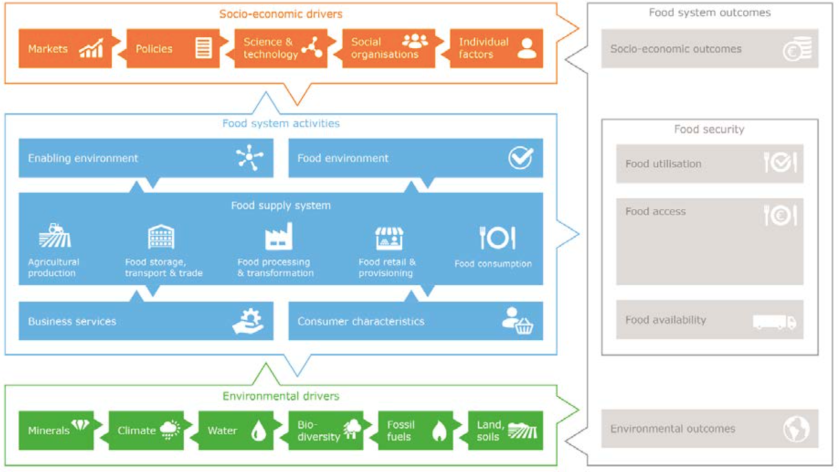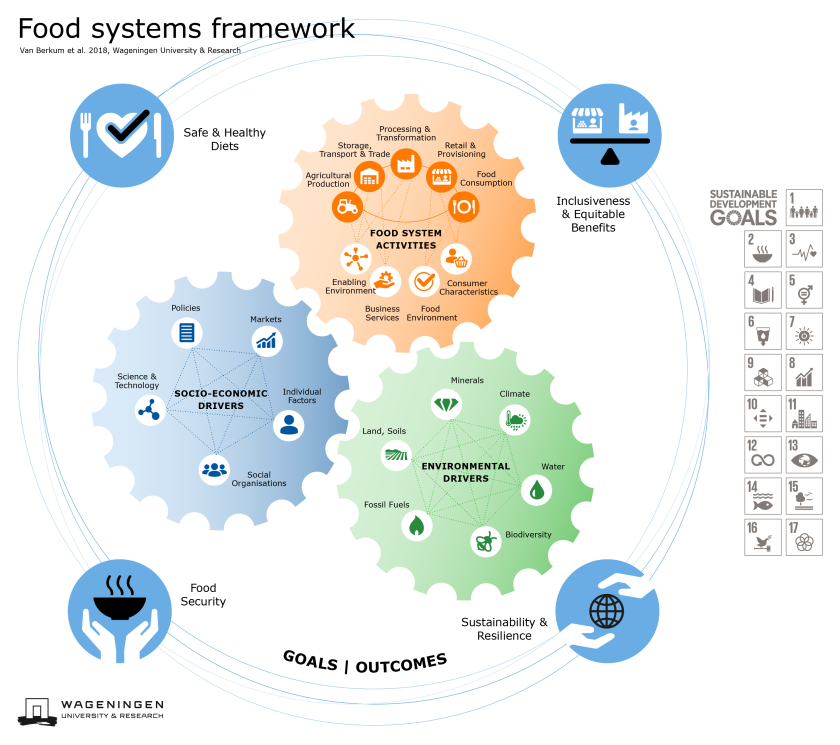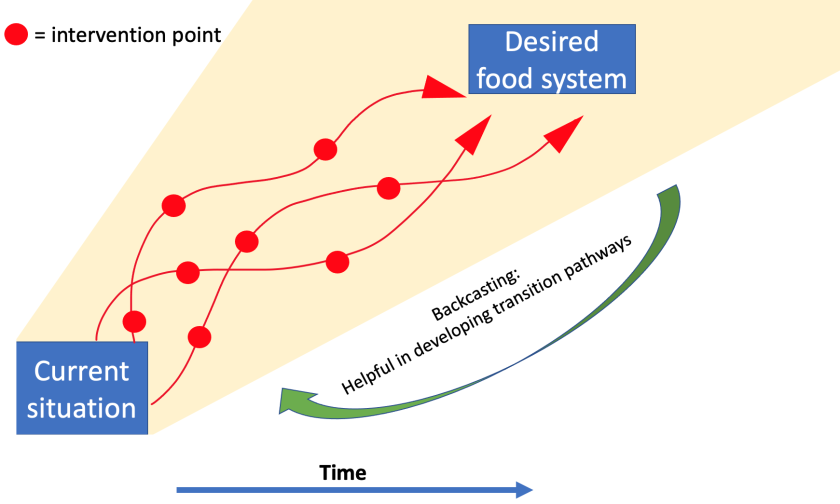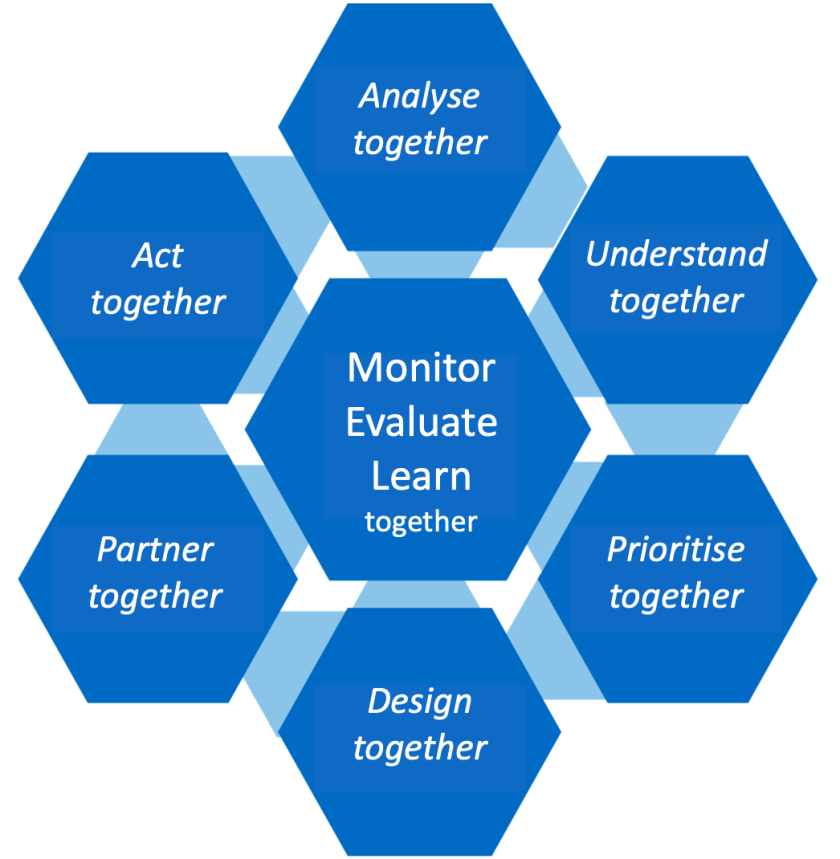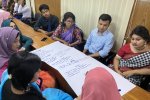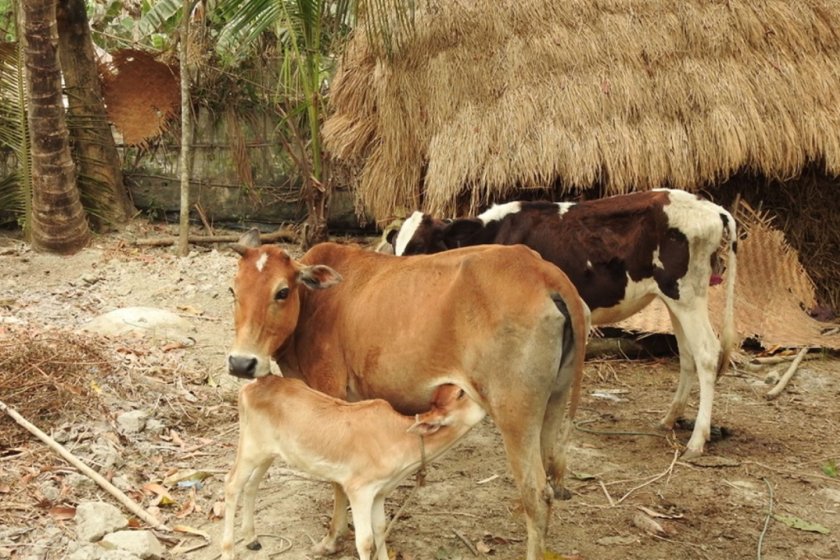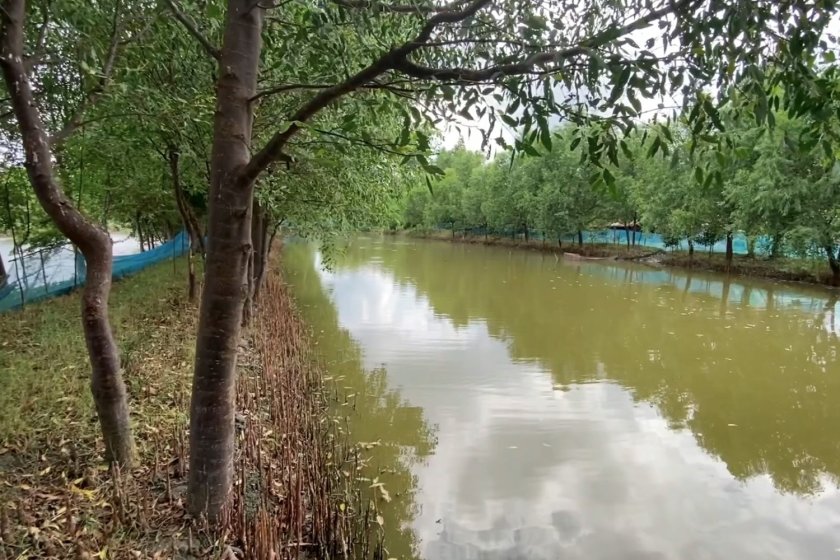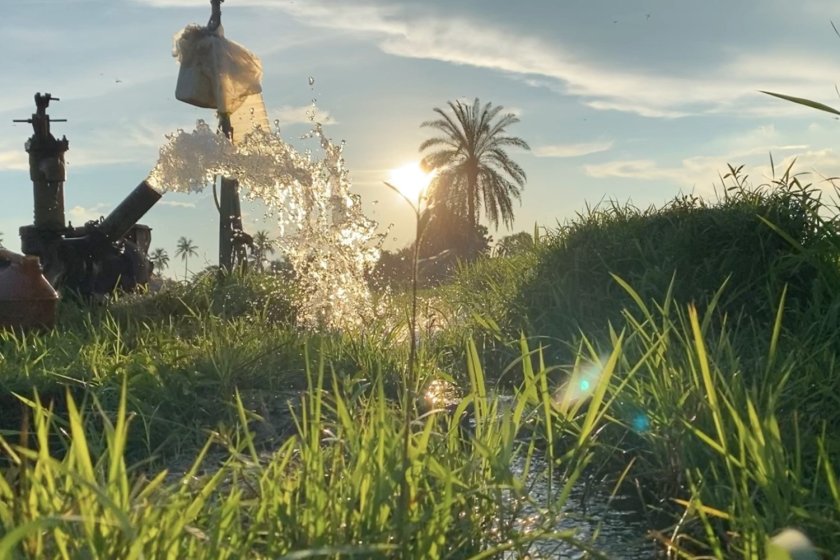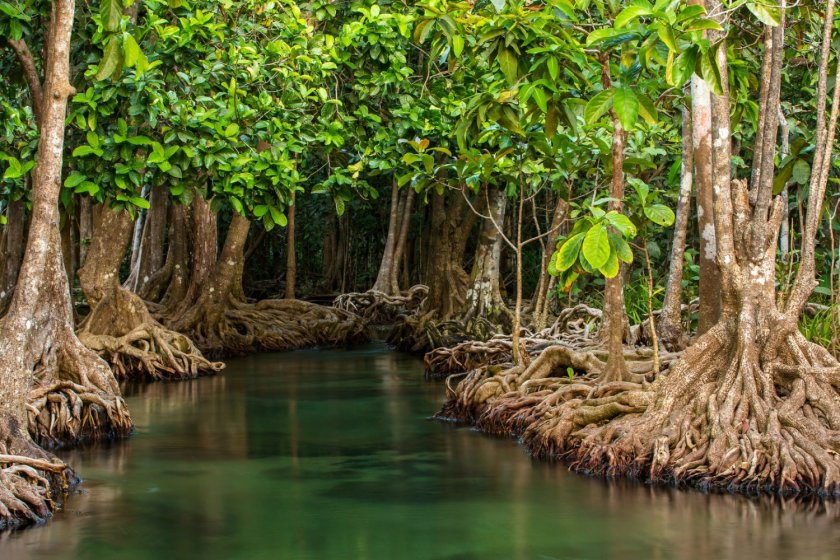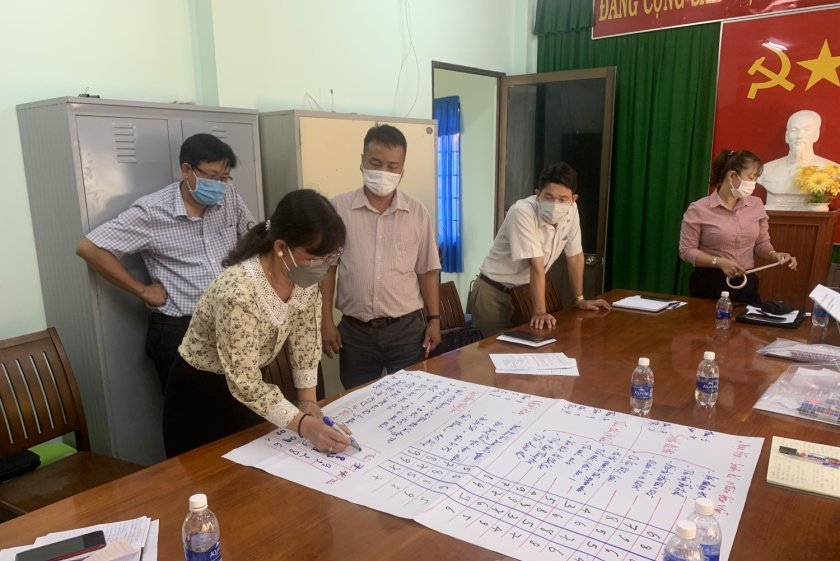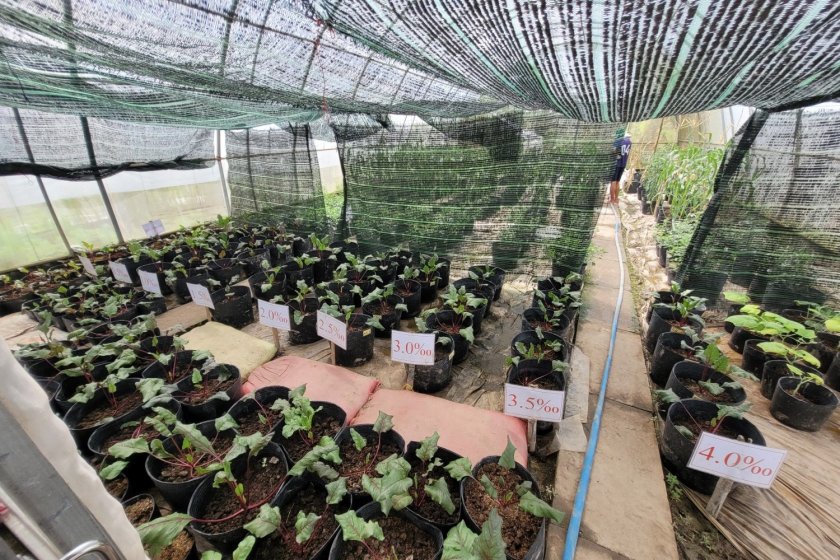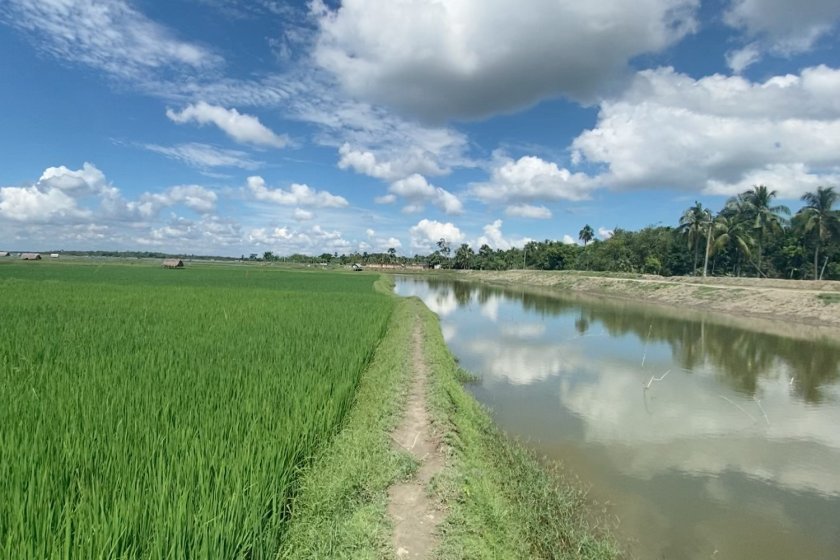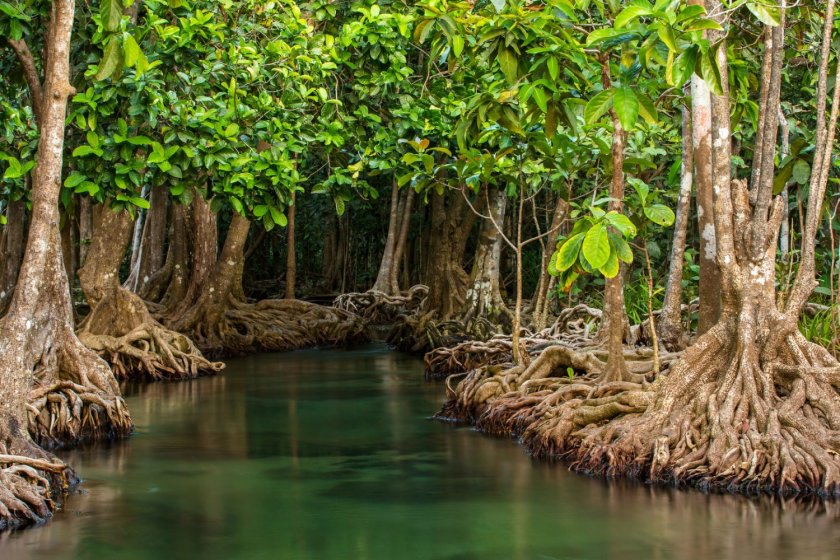
Food system transitions in deltas under pressure
Deltas are simultaneously the most promising and the most vulnerable places in the world. They are promising because they are home to fertile land, strategic harbours, excellent living conditions and are rich in biodiversity. However, they are vulnerable because to a host of threats, including floods, droughts, cyclones, tsunamis, earthquakes, salinity intrusion, rising sea levels and land subsidence. The number of people living in deltas is also growing, and their diets are changing.
To get more insight into today’s challenges and tomorrow’s solutions, one can use a systematic approach. This webpage aims to provide you with a particular kind of systematic approach – the food systems approach – and show how it can be applied in deltas. We build on the Deltas Under Pressure research programme, in which sustainable transition pathways address major goals, such as SDG2 (Zero Hunger) and SDG6 (Water). Both are very important to achieve sustainable agriculture in the delta of Bangladesh and the Mekong delta in Vietnam.
We hope you enjoy reading the texts and watching the videos! If you have any questions, please contact Catharien Terwisscha van Scheltinga, Project Leader and Senior Scientist of Adaptive Delta Management at Wageningen University & Research via the contact button on this page.
Food systems approach in deltas
Wageningen University & Research has developed and uses a food systems approach to analyse increasingly complex food systems in deltas. Food systems are about balancing the provision of sustainable, affordable and nutritious food while dealing with various factors and interests. For local policymakers, it is often challenging to maintain oversight, not least because decision-making processes are spread across different actors. Farmers have different goals and tools than ministries, the private sector and NGOs. The food systems approach helps us understand how the roles and links between the stakeholders should be balanced.
In the food systems approach, there are objectives: 1) to provide enough nutritious food for everyone; 2) to provide safe food required for a healthy diet; 3) the equitable and fair distribution of costs and revenues along the food supply chain, and 4) to create a sustainable and climate-resilient food system that safeguards biodiversity.
For a general introduction to the food systems approach, watch the video 'The WUR Food Systems Approach explained'.
Deltas under pressure and the food systems approach in deltas
- Unfortunately, your cookie settings do not allow videos to be displayed. - check your settings
What's in this video?
This video shows why a food systems approach is so useful in deltas.
Collaboration in food system transitions
Solidaridad and WUR’s collaboration in food system transitions in Bangladesh
- Unfortunately, your cookie settings do not allow videos to be displayed. - check your settings
What's in the video?
In this video, Selim Reza Hasan describes the landscape approach that Solidaridad uses and its links with food systems thinking. He appreciates the collaboration between Wageningen and Solidaridad as an example of linking research with a practical initiative.
Transition pathways towards the future
Transition pathways approaches can be combined with the food systems approach to explore potential solutions in deltas. Transition pathways are routes towards sustainable future food systems that serve the needs of key stakeholders.
The first step is stakeholders jointly developing at least one vision of a sustainable future food system. In this case, the vision needs to address sustainability issues in the current system. The next step is exploring what sequence of incremental changes might lead the present system to develop into the future vision. If all these smaller changes are plausible, the transition pathway as a whole also is plausible, implying that the developed vision for the future is realistic.
Wageningen University & Research has developed a set of guidelines that give policymakers, researchers and practitioners tools to facilitate the exploration of transition pathways in deltas that align with actors’ needs, balance the food systems’ four goals (previous video) and that are broadly supported. The figure shows the framework that is central to these guidelines to facilitate transition pathways in deltas under pressure. A practical guide for facilitating transitions has been developed as part of recent research.
Watch the video to learn more about transition pathways and why they are so useful in establishing sustainable future food systems in deltas.
- Unfortunately, your cookie settings do not allow videos to be displayed. - check your settings
Developing transition pathways in practice by students
In September and October 2022, workshops on developing transition pathways for food systems in the Bangladesh delta were organised in collaboration with IAAS Bangladesh at Khulna University and Patuakhali University of Science and Technology (PSTU). In these workshops, student groups developed transition pathways for the future they envisioned for Bangladesh’s food system. In the workshop at Khulna University, students chose their geographical focus area, from the whole country to a specific community. Meanwhile, at PSTU, students were encouraged to focus on the Barisal region.
The guidelines for facilitating transition pathways were used as a framework to guide vision and transition pathway development. Afterwards, representatives from the different groups presented their future visions and pathways to their peers. After gaining better understanding of the food system and prioritising challenges and problems, the teams developed future visions of the food systems. Lastly, they developed transition pathways to reach those visions. Back casting was applied to assist in finding an appropriate order for the steps.
To give some examples, one of the groups focussed on the dietary diversity in the Barisal region and identified transition pathways to increase dietary diversity. They encouraged improving storage and transport facilities, raising awareness and diversifying production. Another group focussed on how the intrusion of salinity was putting the food system under pressure. In their vision for the future, technology for dealing with salinity was employed alongside landscape interventions to increase freshwater storage and infiltration.
Bangladesh
Different deltas around the world face different food system challenges. When describing the challenges at stake in terms of the four food system objectives, the trade-offs and synergies between the goals become apparent. This website tells the story of the food system challenges in the delta of Bangladesh and the Mekong Delta in Vietnam. In Bangladesh, the challenge is producing healthy food and enough of it for the growing population while limiting negative effects for the environment, ensuring income for farmers and tackling climate change.
By clicking on the tiles below, you can find more information about specific topics and transition pathways. You may find these informative or might want to apply the methodologies yourself. Let us know how you find them!
Vietnam
In the Mekong delta of Vietnam, traditional rice cultivation is under pressure owing to climate change, land subsidence and intensive cultivation. Salinisation is putting the food system under further pressure. There is also a need and desire to diversify food production. This diversification could lead to higher yields for farmers as well as more diverse and healthy diets as in general. Switching from rice to shrimp and dragon fruit cultivation, for example, offers solutions for dealing with increasing salinity in the Mekong delta. This and other challenges in the Vietnamese food systems are addressed in a videoby Ivo Demmers (WUR) and Dang Kieu Nhan (Can Tho University, Vietnam). The other topics and pathways discussed on this website are themed around salinity; a key factor shaping agriculture and food systems in the Mekong Delta of Vietnam.Find out more by clicking on the tiles below.
Reflections on doing research in support of Food Systems Transformation processes in Deltas under Pressure
Reflections on doing research in support of Food Systems Transformation processes in Deltas under Pressure
As a researcher it can be a challenge to generate knowledge to contribute to something so complex as food systems transformation and transition pathways. As a team we took the opportunity to reflect on our experiences in this project, and what we have learned from takingfood systems approach to research as a team of interdisciplinary researchers with varioustechnical expertise.
Role of the Researcher
An important realisation has been that it takes time to find out how to study and contribute to transition pathways as a researcher, and for researchers to integrate a food systems approach in their thinking and research. This also includes reflecting on what role researchers can or should have in a transition process. Should research focus on supporting on-going processes with expert knowledge, or do we have a role in facilitating or even designing transition processes with local partners and stakeholders?
This of course also depends on your field of expertise as well the phase of transition, but being aware of the implications the role you take, requires thoughtful reflection on the bias that comes along with being a researcher in a certain field of expertise who is not part of a local context.
Another learning for our team was that in dealing with complexity, it is important to acknowledge that you will always miss parts of the puzzle. High complexity often means that there is no optimal starting point and as such researchers must be willing to start somewhere, and learn by doing. This means having to learn to be comfortable with uncertainty and making time to stop and reflect. It also requires researchers to be proactive in finding direction and identifying opportunities for collaboration with other researchers and stakeholders. Being honest and transparent about what you do not know and what you are uncertain about, and discussing this with your team – including partners and stakeholders - was experienced as helpful in navigating uncertainty and associated discomfort.
The added value of using a Food Systems Approach
The complex and dynamic nature of problems also requires an iterative approach to problem definition and analysis, and it is important to do this with local partners. Local context is essential to make sure that the knowledge you generate is relevant, which is why collaboration with local partners and engagement of local stakeholders, supported by regular field visits and in-person exchanges, are a crucial part of doing research. In fostering productive collaboration with local partners, trust is a key component. This means investing in equal partnership and relationship building, and being explicit about definitions, expectations and uncertainties. Open dialogue, shared experiences and appreciation of different perspectives is essential herein. Generally this requires long-term commitment and investment in relationships. Investing in a common language as a basis for collaboration across disciplines and stakeholders from different contexts is crucial. We found that the Food Systems Approach can offers this.
In our experience in this project, using the Food Systems Approach as an analytical framework helped us as a team of technical researchers from different disciplines working on complex issues in several ways. The food systems approach offers a common language that facilitates communication and collaboration between different research disciplines and with diverse stakeholders. Have a shared language for communication allows the incorporation of different perspectives and knowledges, which helps to create a more complete understanding of the problems and their impacts. Additionally it allows different stakeholders to analyzeand understand the situation together. Creating a shared understanding is an essential basis for identifying potential interventions, andformulating shared goals to work towards together. This is essential for researchers to ensure that the knowledge they generate knowledge that contributes to a shared vision, by supporting and informing the development of transition pathways that fit local realities.
Reflections and ways forward
The food systems approach and the co-development of sustainable transition pathways help us to find more integrated solutions to tackle uncertainties and complexities, and to create a more sustainable future. To address complexity, we should not focus exclusively on food, agriculture or water: we need a language in which we can address them all together. We urgently need solutions for living sustainably in our deltas, now and in the future. Watch the video for further reflections and conclusions.
- Unfortunately, your cookie settings do not allow videos to be displayed. - check your settings
We did our best to refer to sources where and when needed. When you notice that we did not do so or did so incorrectly, kindly contact us via the contact form on the right top.
Lastly, we would like to thank everyone who contributed to this storytelling website in one way or another.
Further reading
- All publications under the Deltas Under Pressure research program
- Deltas under pressure, guidelines to facilitate transition pathways
- Exploring Transition Pathways to Support Food System Transitions. Facilitation guide for Practitioners
- Exploring Transition Pathways towards sustainable food systems. Background and Introduction to the Approach
- Options for mangrove-friendly alternative livelihoods in the mangrove ecosystem
- Modelling choices and social interactions with a threshold public good: Investment decisions in a polder in Bangladesh
- Water management for food systems: case study Bangladesh
- Adaptive delta management for resilient food systems
References
Ishtiaque, A., Sangwan, N., & Yu, D. J. (2017). Robust-yet-fragile nature of partly engineered social-ecological systems: a case study of coastal Bangladesh. Ecology and Society, 22(3)
Van Berkum, S., Dengerink, J., & Ruben, R. (2018).The food systems approach: sustainable solutions for a sufficient supply of healthy food(No. 2018-064). Wageningen Economic Research.
